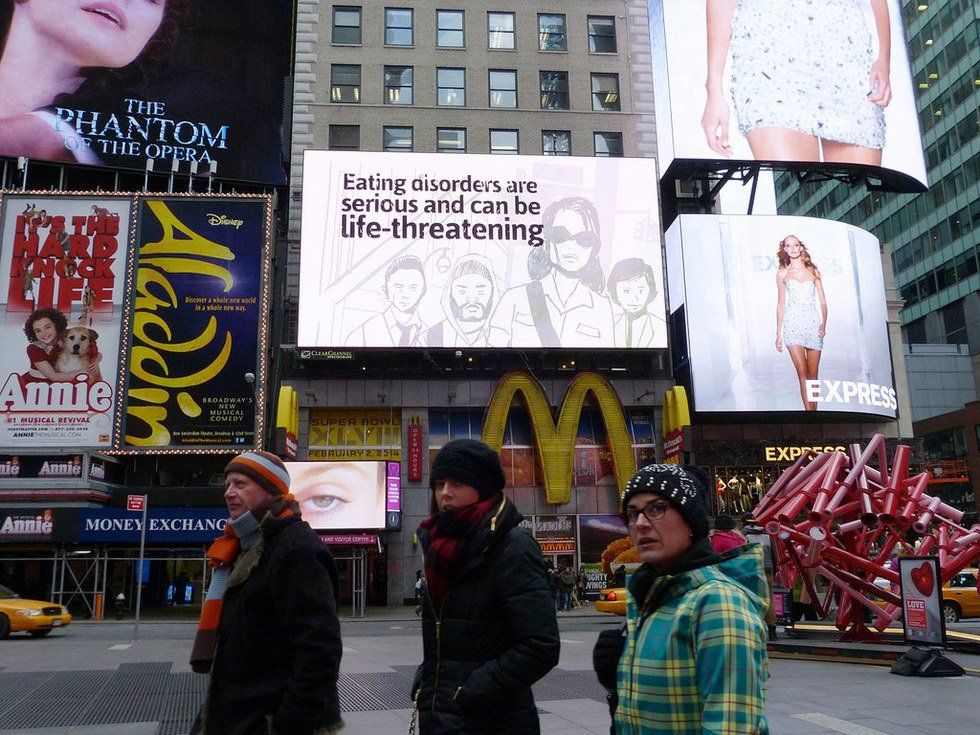My disordered eating issues and negative body image probably first showed themselves when I was around the age of 12 or 13.
In the eighth grade, I ran on the treadmill and then weighed myself after everyday. I skipped meals. I lost a little bit of weight and felt good about myself. I reminded myself everyday that I was the fattest of my friends, and believed that meant I was the ugliest and that I needed to continue to lose weight to be pretty.
My disordered eating was the worst when I was in my sophomore and junior years of high school. I would binge and purge, binge and starve myself, binge and cleanse (“cleansing” involved drinking lemon water with maple syrup and cayenne pepper and eating fruit for meals and a small dinner), or just binge.
I would go buy snacks in the middle of the night, so my mom wouldn’t know. I would throw up in the shower after dinner sometimes, so that I could satisfy the need to purge without my mom hearing me.
I went on Weight Watchers and lost 12 pounds. I achieved the correct amount of “points” by bingeing and then not eating or eating fruit. I never ate three meals a day. I never listened to my body. I never stopped when I was full or ate when I was hungry.
Feeling full made me feel ashamed and relieved. Feeling hungry made me feel accomplished. I could not see another woman without comparing our thighs, arms, calves, and stomach.
I could not look in the mirror without telling myself that I was disgusting. I could not weigh myself without then going back to weigh myself again 5 minutes later.
My therapist asked me to picture a pie and to tell her what percentage of the pie would be how much of the time I thought about food and my body. I reserved 80% of the pie for food and my body and 20% for everything else.
She sent me to a nutritionist. I started taking Prozac. I kept seeing her. I began to recover.
I consider myself in recovery now, but I do not consider myself recovered because I still have urges and I still obsess sometimes, but I’ve gotten better at coping with both, and I’ve worked to change and improve the way I look at my body and to stop self harming with food.
While, I am incredibly thankful for my recovery, I also think it is important to point out that everyone with disordered eating issues deserves the same access to care, regardless of race, gender, and class, and/or any other aspect of their identity, and at this point in time, not everyone does.
This desperately needs to change, and many actions need to be taken in order to see a real difference.
Firstly, all those with eating disorders need to be made to feel like they have a valid illness; disordered eating isn’t a choice, it is a sickness.
Secondly, but just as necessary, real efforts need to be made to reduce the bias many people and medical professionals have about who is and isn’t susceptible to developing an eating disorder.
Many have the perception that only white, middle to upper class, cis-women have eating disorders, but that is completely false. Anyone can develop an eating disorder.
A diagnosis shouldn’t be affected by a person’s social characteristics or stereotypes. This bias is dangerous and denies care to many who suffer from disordered eating, but don’t fit the stereotypical image of the sufferer.
Another necessity is of course financial assistance for those who have disordered eating issues, but are not able to afford care for their disorder.
My recovery was largely impacted and made possible by my privilege, but recovery should not be thought of as a privilege; it is and should be a right of everyone who has an eating disorder to get help.
Thus, it is hugely necessary for changes to be made to make recovery a possibility for every single person who is affected by disordered eating.





















